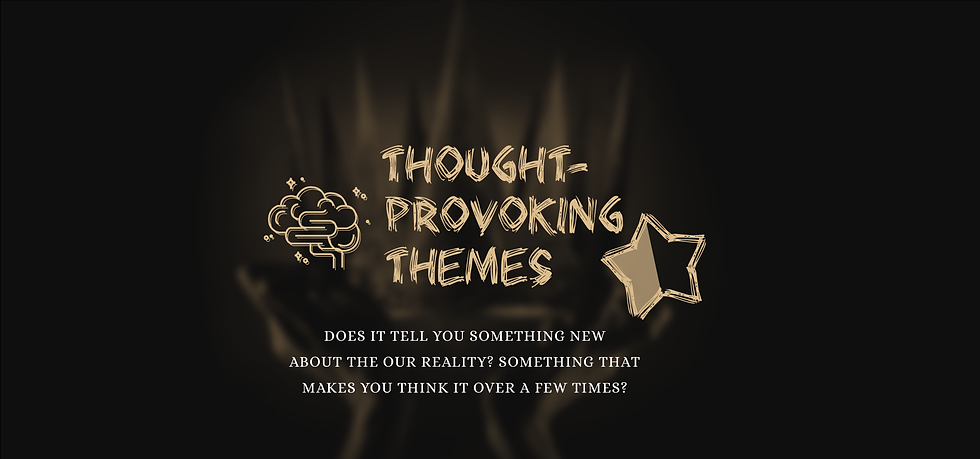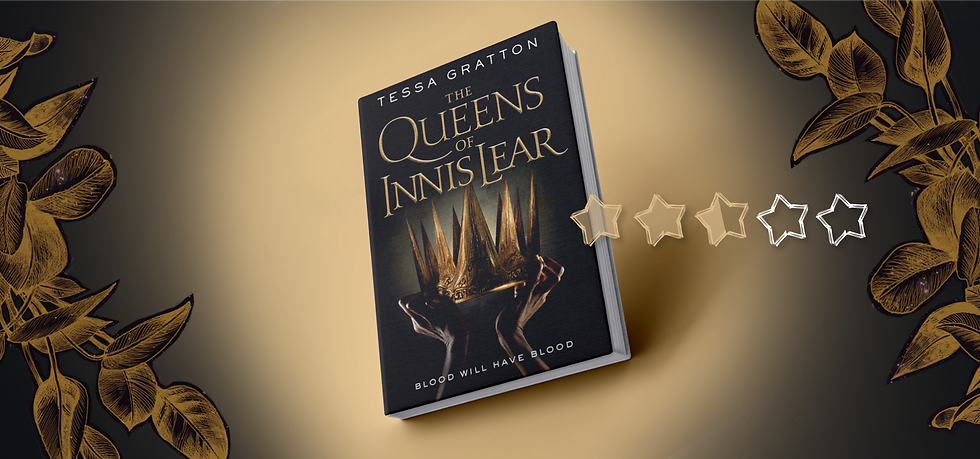Good for Reading? ∣ The Queens of Innis Lear: An Analysis
- Sheepish Samitha

- Jul 28
- 8 min read


Have you ever wondered if storytelling could save the world?
Before you roll your eyes at me for the absurd thing I say, I must tell you they can. But you’re right, stories might not change everything on their own; they’re just a good start. Where do you think money came from? Trees? Last I checked, a sheet of paper is worth less than a dollar.
That’s right, money started off as a story, not an objective reality.
Welcome to my odd review series, where I categorize how much novels question our beliefs about life, and how much they merely take them for granted.

W H A T I S T H E Q U E E N ' S O F I N N I S L E A R ?
I have decided I want to be more of a mood reader on this blog, so instead of following a very strict TBR, I decided I would go with whatever I want to read, hence I’m not following proper rules here, and instead, following this book’s hidden lesson.
Yes, this book is not an award-winning masterpiece, but I recall having heard good things about it, so I decided to give it a shot. Don’t be fooled by Goodreads’ ratings, please.
On another note, I am aware that this book is a Shakespeare retelling, but I can’t say I’ve read the original. Bear this in mind, as this will be an analysis of the current book and how it stands on its own. Not a comparison with the original.
Without anything else to say, let’s begin!
***
Innis Lear needed a new king.
The island begged for it, the royal family demanded it, and the people of the kingdom hoped for a quick and painless succession. The king, however, refused to leave the throne without choosing one of his daughters as Queen.
The answer was plain simple, the eldest would get the crown, as everyone anticipated.
But the king’s madness extends beyond imagination.
He won’t choose as he is expected to.
F U N

I will go right ahead and say what I want to avoid saying first.
This book was too long for its own good.
Saying it was too long could possibly mean it was a waste of time, and that, maybe, it was too boring for anyone to like it, but I hate to say it isn’t so. Yes, it was slow, as many, much too beautiful descriptions got in the way of the plot, and not a lot happened between chapters, but it was far from a bad book.
The family intrigue regarding the king’s madness kept me going steadily, even when too little was happening, because the characters were the life of this story. Most characters did feel like real people as they were all tormented with one trauma or another, and each followed their own desires regardless of the convenience of the plot, or perhaps, preestablished tropes in the genre.
Sometimes I could find myself loving evil characters, and at the same time, not being able to condone their actions at all, which made it exhilarating in a way. These were characters that captured complexity in a way that many books I’ve read can’t. Won’t say this is the best example for this complexity I speak of, but it’s a step in the right direction.
The plot, though it wasn’t too interesting, didn’t need to be because the magic of the book was not in going through hoops, but in experiencing the setting, the traumas, and the feelings that led the characters where they needed to go.
I cannot say this is the most interesting storytelling device, but it is a book to sit down and experience. At least, it does have a different style from what I’ve seen out there lately.
Another point I’d like to raise is the romance.
It was a sub-plot, not its core, and I was fairly pleased with the result.
Maybe I am pleased with it as this is the first book in a duology, but I am pleased regardless. Though the moments were spread far and in between, I found it all made sense with how the plot moved and with the character’s history and build-up, which made nothing feel like fan service or just there to please an audience.
And that is refreshing, if nothing else was.
This is a love triangle done in a way that made sense for the story, making it different from the norm, if I dare say.
Which is always good.
For me, I guess. Maybe not for publishing companies.
Verdict? W O R K S F O R M E
W E L L W R I T T E N

This must be the prettiest book I’ve read.
The way the author writes descriptions is something on another level. It reads as poetry, most times. I say that because, being accustomed to Sanderson’s simple writing, I never knew how beautiful writing could be. I’m not sure this qualifies as purple prose, as I didn’t find it over the top, but I know it's closer to that than any other style I've come across.
The problem I had with this book specifically, was how, in trying to make it stunning at all times, the pace slowed almost to a halt. But this you already knew. What you might not know is that there were perhaps other factors that influenced the pacing and length, too, among them being how redundant it was. I remember reading about one of the daughters’ infertility time and time again, and I could not believe anyone wouldn’t already know this about her, as the author kept insisting and insisting with so much detail. Every. Single. Time.
I know it’s a sensitive topic, and you have to treat it with care, but sometimes it errs on the repetitive side.
I also would argue that scenes only served one purpose at a time, which isn’t great when length is concerned. It could’ve maybe helped shorten the novel if she could use one scene to solve more than one problem, but I’m not even sure if it would be the same experience either way.
In any case, that was maybe the worst I could find.
The rest of the novel was well thought out; it all made sense within the world, and no magic solved every problem.
It wasn’t the most complex of books, or the most surprising, in the sense of plot or themes, but it was well done.
And that’s something.
I guess my luck is improving as I’m finding better books to read?
Verdict? W O R K S F O R M E
T H O U G T - P R O V O K I N G T H E M E S

There is an important topic touched upon here that I argue would be popular nowadays.
I perhaps would’ve thought it more engaging if it had a more critical stance apart from touching on how it affects us at an individual level, but irrespective, it is something we should still think about.
It’s the magic system.
Or more than the magic system, it’s what the magic system represents.
Both the stars and wormwork have a hidden meaning. My explanation will have a little bit of a spoiler here—not too much to ruin the whole thing, but if you don’t want to know anything, better beware.
Elia, the third daughter, is stuck forever on the stars, ignoring wormwork. The stars, immobile as they are, only communicate in prophecies, which means they represent the static, the way it is or has to be. They represent the rules, the structure, and the expectations one is meant to follow as we are part of a system. Elia is supposed to be one thing according to the stars; her family imposes it on her as well.
Now, wormwork is something always more visceral. It encompasses the good and the bad, the animalistic viciousness of nature, but also the same kindness given in turn. It is the way the wind moves, what the water feels like, it’s the connection to the innermost self, and how that self perceives. This is what Elia wants, what she desires.
The book goes back and forth between these two things.
Stuck between doing what’s expected versus doing what is desired is the central part of the theme.
I’d say this is something important, as sometimes we might attribute too much of a heavy burden on the rules, or be single-minded in our desires, so I think there is value in thinking critically about it.
However, I am missing the nuance this theme might have. Is there a correct answer even? Or are those the only choices?
The novel goes to a certain point in its exploration, but I’m missing something a little more complex.
I will give it a half star, because what it does, it does wonderfully.
Verdict? M A Y B E
C R I T I C A L C O M M E N T A R Y

I will continue my train of thought here.
I missed some nuance because it wasn’t too critical with what it was tackling.
The rules presented in the book were taken for granted; those were never questioned in their validity. The rules the characters followed, the system they envisioned, were never at the front of the conflict. Yes, either following them a hundred percent or none at all carried consequences, but I wanted more on how to discern.
How do we know if we’re doing it right? If there is even a right choice, or if there could be more choices than those?
I guess there is another volume to this story, and perhaps that’s where it’ll be explored. But, I’ll have to remove this star here because I still feel it lacked some depth.
It isn’t the end of the world, but…
I have to be honest, that’s how I feel about it so far.
Verdict? N O T F O R M E
P R O P O S E S A L T E R N A T I V E S

I couldn’t find much that couldn’t have been explored by any other media here.
Proposing something new is a challenge, and not many can do it. This is why I’ve ventured to find that five-star book that has it all. Or those multiple ones, because I would love for there to be many.
Either way, The Queens of Innis Lear was sadly not that one.
Though it did the storytelling and the writing part very well, it lacked something a bit more critical to it.
Like I said, it isn’t the end of the world, as it at least doesn’t offer anything too harmful, but it doesn’t venture out from our conventional way of thinking. We’ve been told to believe the same things over and over, and despite it not being too toxic on any front, I’d say The Queens of Innis Lear does perpetuate the same model of living we’ve followed from generations on end, which has been proven, time and again, to be harmful to us and the planet.
This is a story about becoming Queen, and about kingdoms playing their usual game, with some thoughtful decision making, but nonetheless.
Nothing new there.
Not that it needs it to be a good book, but it’s always a plus.
Verdict? N O T F O R M E
To make a long story short, this book got:









Comments